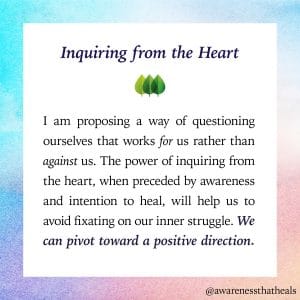Although most of us already ask ourselves questions about how we might make positive changes in our lives, those questions are often asked in ways that do not support us and do not bring healing. They can be expressed with a negative edge like, “Why aren’t you making more progress?” or “Why are you stuck in this feeling?” or “Can’t you do something better than get angry in this way?” Although this way of talking to ourselves takes the form of questions, these are expressed in accusatory tones and are actually thinly veiled judgments which reinforce discouragement, helplessness, and self-rejection.
 A client came to me asking the question, “I can’t find a way to have a good love relationship. What’s wrong with me?” I pointed out that her question didn’t stimulate any curiosity, caring or alertness that could lead to any benefit. It became clear as we explored this together that she had tricked herself into believing she was coming from real curiosity. As we looked more closely, she was able to see that her question was quite self-critical as well as hurtful and discouraging. It sabotaged her efforts instead of supporting her to focus on small, practical steps she could take that could lead to the insights she needed. Seeing this led to a host of new questions that were aimed straight at her potential to respond more supportively to herself on a week-by-week basis. Ultimately, the question she asked was, “What can I do or how can I be different to increase my chances of finding a good love relationship?”
A client came to me asking the question, “I can’t find a way to have a good love relationship. What’s wrong with me?” I pointed out that her question didn’t stimulate any curiosity, caring or alertness that could lead to any benefit. It became clear as we explored this together that she had tricked herself into believing she was coming from real curiosity. As we looked more closely, she was able to see that her question was quite self-critical as well as hurtful and discouraging. It sabotaged her efforts instead of supporting her to focus on small, practical steps she could take that could lead to the insights she needed. Seeing this led to a host of new questions that were aimed straight at her potential to respond more supportively to herself on a week-by-week basis. Ultimately, the question she asked was, “What can I do or how can I be different to increase my chances of finding a good love relationship?”
Here are the examples of the kinds of questions that are from the heart:
- How can I take the next realistic step to best care for myself?
- What is that one important thing that I want to do more often every day to feel more fulfilled? And: What would I have to give up to make space in my life to do that?
- What are the actual thoughts or actions that will best support me when I feel a challenging feeling such as anxiety, anger or sadness?
Questions such as these help you access your wisdom and intuitive intelligence while keeping your heart engaged; they help you contemplate and take actions that support your well-being; they help you respond effectively to a challenging situation or feeling.

